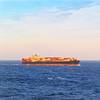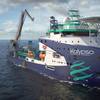Protestors rappelled off a bridge in Portland, Oregon on Wednesday hoping to delay Royal Dutch Shell's Arctic oil exploration this summer by blocking the return of a ship to Alaska that holds emergency equipment.
Greenpeace said 13 protestors lowered themselves from the St. John's bridge in the early morning and 13 others on the traffic level of the bridge are assisting them.
"Depending on the weather they can stay there for three to five days," said Cassady Sharp, a spokeswoman for Greenpeace, which says Arctic drilling could be damaging to populations of whales, polar bears and walrus if there is an oil spill.
The danglers have food and water and plan to sleep in hammocks suspended over the Willamette River, which provides shipping access to the Pacific Ocean from Portland.
The Fennica, an icebreaker Shell is leasing, was set to begin its journey back to Alaska on Wednesday morning, the protestors said, citing shipping charts.
The Fennica had returned to Portland in recent days for repairs to a three foot (1 meter) gash it suffered in Alaska earlier this month. The ship holds a capping stack, or required equipment that would help plug a oil well, should one blow out.
Until the Fennica returns to the Chukchi Sea off northern Alaska, Shell is not allowed to drill into the oil bearing zone, the Interior Department said last week in issuing the final permits for exploration. Any delays could be costly as the exploration season only lasts until about October, when sea ice returns.
President Barack Obama has tried to strike a balance in the Arctic by expanding protected areas of Alaska's Arctic National Wildlife Refuge this spring. But at the same time his Interior Department is allowing Shell to return to drilling leases the company obtained when George W. Bush was president.
Shell said that the protestors had not delayed Fennica's journey back to the Arctic.
"The Fennica will begin its return journey to Alaska once we've completed the final preparations," spokesman Curtis Smith said.
Shell has spent about $7 billion to explore for oil in the Arctic. It hopes to return to the exploration for the first time since 2012, when the company experienced several mishaps, including the grounding of a drilling rig that later had to be scrapped. If Shell discovers oil that can be recovered economically, production would not begin for at least 10 years.
(Reporting by Timothy Gardner; Editing by Andrew Hay)
















